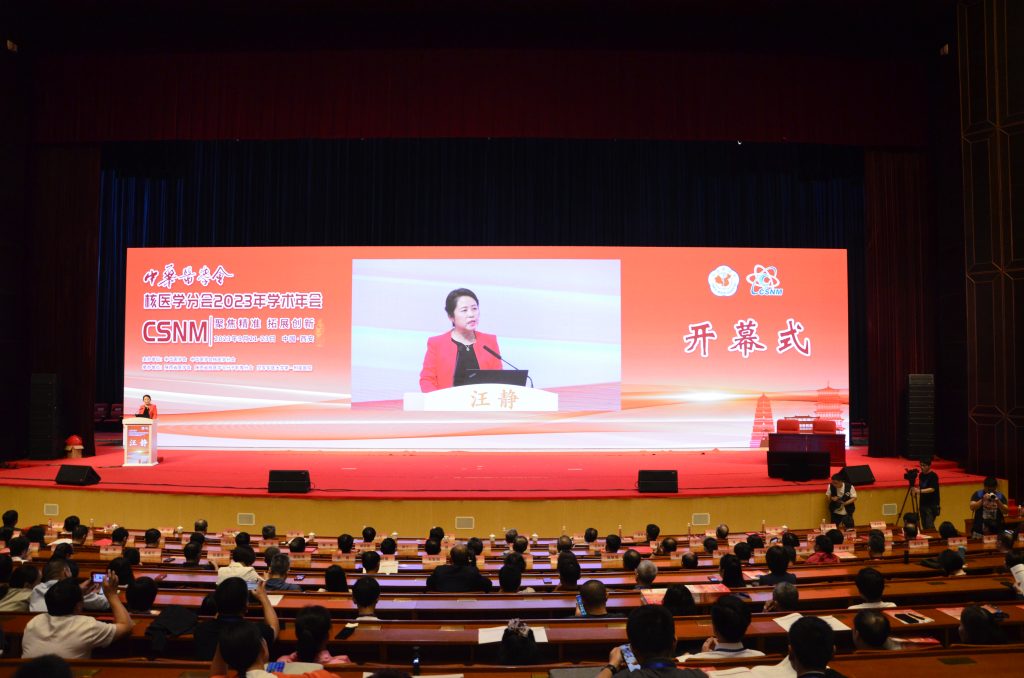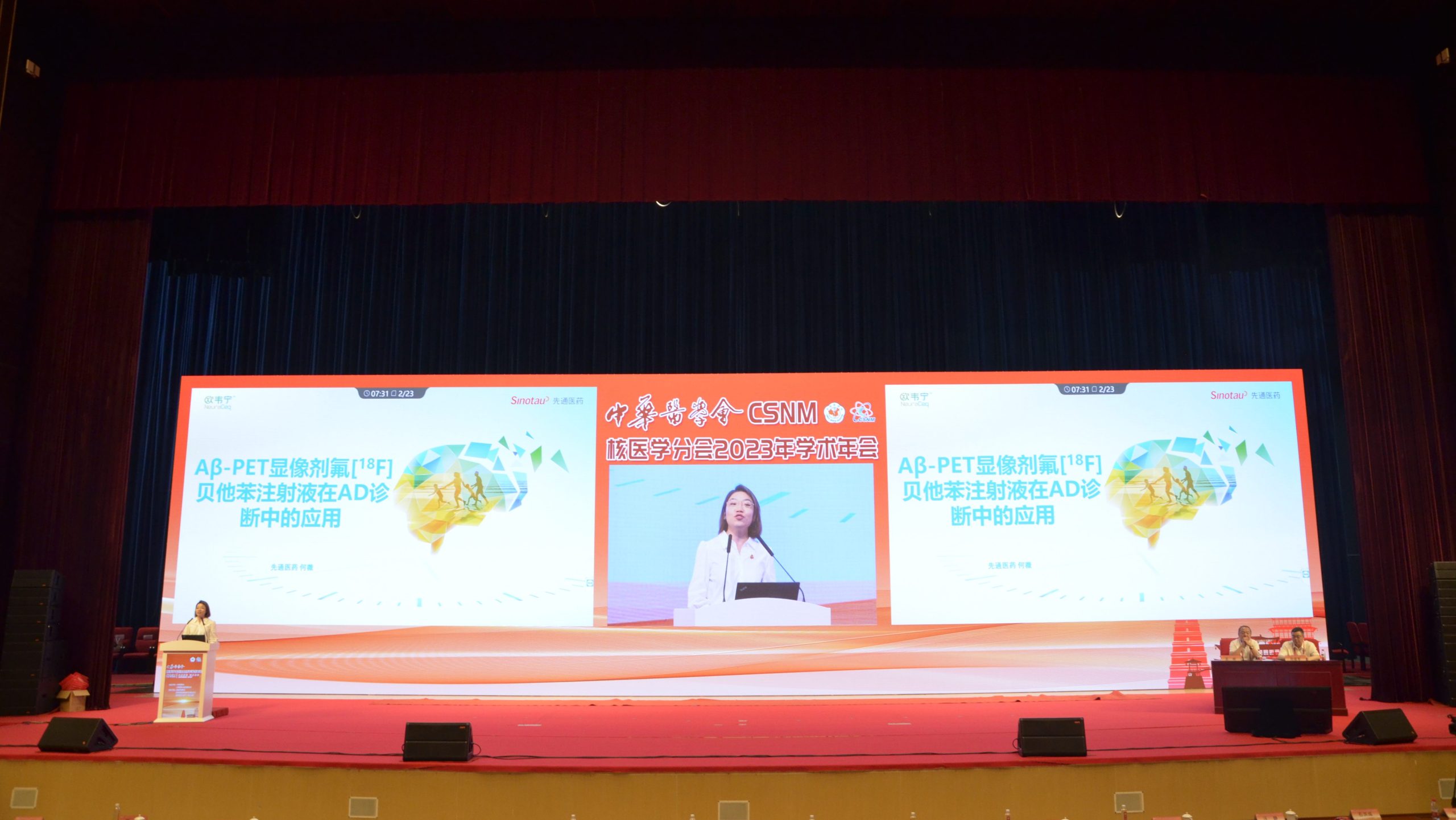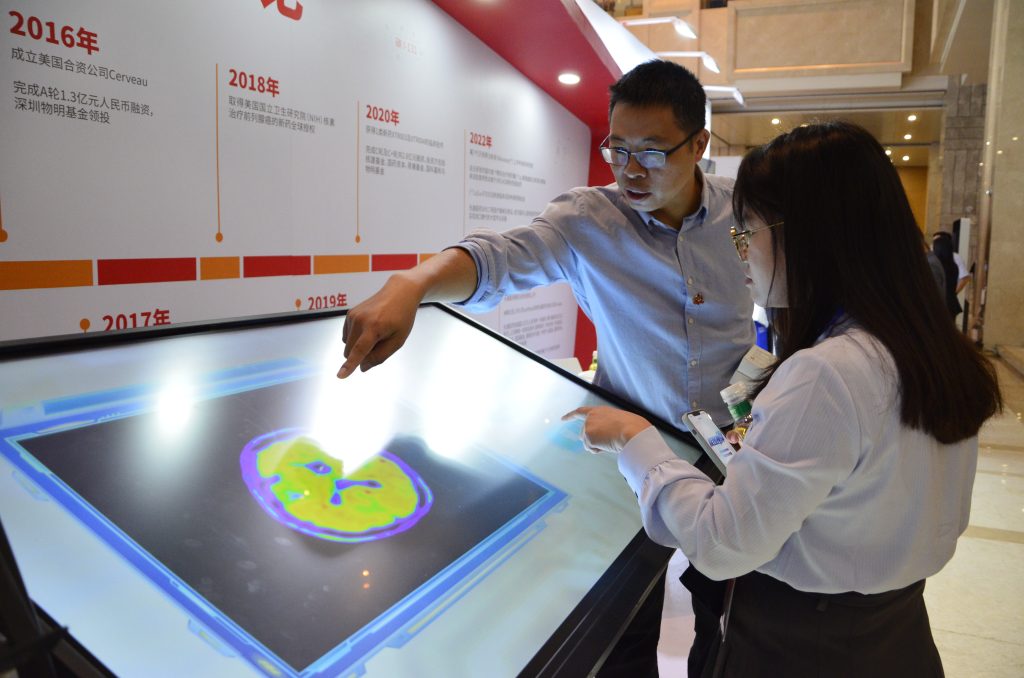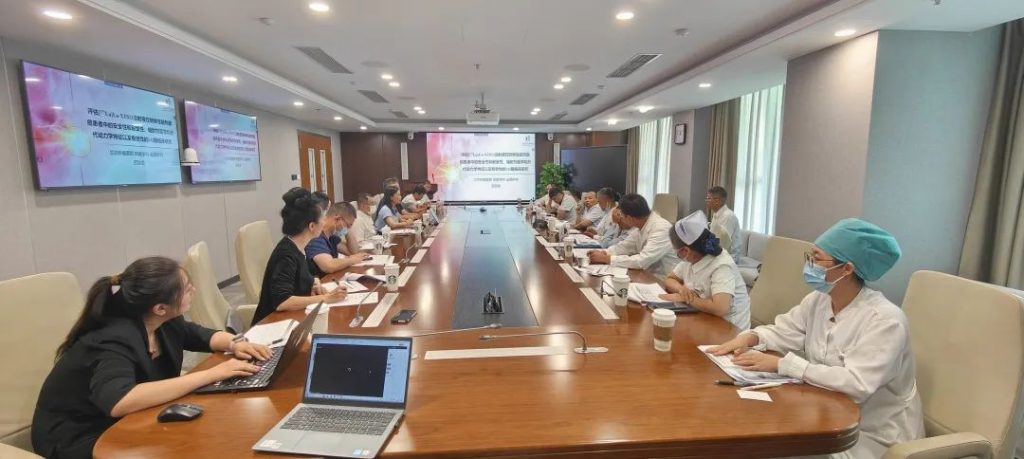Recently published updated guidelines developed by a working group of the National Institute on Aging and the Alzheimer’s Association (NIA-AA) state that Alzheimer’s disease should be defined biologically, using protein-based biomarkers. These guidelines recommend that biomarkers, including both amyloid- and tau-PET imaging, may be used to diagnose Alzheimer’s disease and provide an indication of its severity.1
NAV-4694 is currently in Phase 3 development and is also being used in academic and industry investigational therapeutic trials. The acquisition of this asset broadens Lantheus’ Alzheimer’s diagnostic portfolio and complements Lantheus’ next generation F18-labeled PET imaging agent candidate, MK-6240 (also known as florquinitau), which targets tau tangles in Alzheimer’s disease.
MK-6240 is an F18-labeled PET imaging agent with a high-affinity to Tau protein. The imaging agent has high contrast in the detection and imaging of Tau protein and can image pathological changes of Tau protein deposition in the brains of AD patients in a non-invasive, accurate, localized and quantitative manner.?Previously, Lantheus acquired global rights to MK-6240?through its acquisition of Cerveau, another entity in which Sinotau was a shareholder. Sinotau retained the rights within China?for MK-6240 under its existing sublicense with Cerveau.
Aβ-PET positive imaging can indicate the presence of AD pathological changes. When combined with Tau-PET test results, it offers significant value for early diagnosis, differential diagnosis, post-anti-Aβ therapy efficacy evaluation, and patient selection for AD drug clinical trials.
Under the terms of the agreement, Lantheus will provide an upfront payment as well as potential additional development and commercial milestone payments. Additionally, Lantheus will make royalty payments for research revenue and commercial sales. Structured as a stock purchase, the agreement specifies, among other things, that the sellers will also provide transition and clinical development services for a prescribed time following the closing of the transaction.
“This acquisition is truly exciting. We have high expectations for the application potential of Aβ-PET and Tau-PET in early diagnosis, clinical staging, and treatment efficacy evaluation of Alzheimer’s disease. Their combined use will provide robust evidence for clinical decision-making in Alzheimer’s diagnosis and treatment.” said Tang Yanmin, CEO, Sinotau.
About Sinotau
Sinotau is an innovative radiopharmaceutical company located in China and developing globally. Headquartered in Beijing, China, has modern radiopharmaceutical intelligent production sites in Jiangsu, Guangdong, and Sichuan, an early discovery center in Shanghai, and a branch in the United States. With three marketed products, and over 20 radiopharmaceuticals pipelines for precise diagnosis and targeted therapy across oncology, neurology and cardiology.
1.Jack CR, et.al. Revised criteria for diagnosis and staging of Alzheimer’s disease: Alzheimer’s Association Workgroup. Alzheimer’s Dement 2024;1-27. https://doi.org/10.1002/alz.13859
]]>After recent approvals in the US, promising disease modifying drugs for AD are on the horizon in China. Early and reliable diagnosis of AD is critical for successful patient management and access to future therapies. Amyloid PET has a pivotal role in the positive clinical study outcomes for new AD drugs such as lecanemab and donanemab, by making selective inclusion of patients with confirmed amyloid pathology in the brain in the trials feasible. Moreover, amyloid clearance was precisely measured with amyloid PET. Sinotau plans to prioritize setup of radiopharmaceutical sites in Jiangsu, Guangdong, and Sichuan provinces, to ensure product distribution to the majority of the Chinese market. All sites will meet requirements for GMP standards.
Neuraceq? has previously been approved by the U.S. Food and Drug Administration (FDA), the European Medicines Agency (EMA), the Medicines and Healthcare Products Regulatory Agency (MHRA) of the United Kingdom and competent health authorities in other territories.
“With Neuraceq? (歐韋寧?) we are very pleased to bring our amyloid PET tracer, a very important and reliable diagnostic imaging agent, to the Chinese market,” said Dr. Ludger Dinkelborg, Managing Director of Life Molecular Imaging.
“LMI is committed to expanding global market access of Neuraceq?. We will continue to partner with local distributors like Sinotau to improve the diagnosis of patients being evaluated for mild cognitive impairment (MCI) and Alzheimer’s disease, and to making Neuraceq? available to referring physicians across the world,” said Colleen Ruby, Chief Operating Officer, Americas and APAC at Life Molecular Imaging.
“Neuraceq? (歐韋寧?), an amyloid PET imaging radiotracer which can be imaged through PET-CT/MRI is the first approved Aβ-PET tracer in China and the first approved PET tracer in China in recent 20 years. As a strong new generation provider in the field of radiopharmaceuticals in China, Sinotau will continue to contribute to innovation in radiopharmaceuticals, accelerate the research and development of urgently needed clinical drugs to better meet the growing clinical needs for diagnosis and treatment”, said Xinsheng Xu, Chairman of Sinotau Pharmaceutical Group.
About Neuraceq (florbetaben 18F)
Indication approved in the US
Neuraceq? is a radioactive diagnostic agent indicated for Positron Emission Tomography (PET) imaging of the brain to estimate β-amyloid neuritic plaque density in adult patients with cognitive impairment who are being evaluated for Alzheimer’s Disease (AD) and other causes of cognitive decline. A negative Neuraceq scan indicates sparse to no neuritic plaques and is inconsistent with a neuropathological diagnosis of AD at the time of image acquisition; a negative scan result reduces the likelihood that a patient’s cognitive impairment is due to AD. A positive Neuraceq scan indicates moderate to frequent amyloid neuritic plaques; neuropathological examination has shown this amount of amyloid neuritic plaque is present in patients with AD but may also be present in patients with other types of neurologic conditions as well as older people with normal cognition. Neuraceq is an adjunct to other diagnostic evaluations.
Limitations of Use
- A positive Neuraceq? scan does not establish the diagnosis of AD or any other cognitive disorder.
- Safety and effectiveness of Neuraceq? have not been established for (i) predicting development of dementia or other neurologic conditions, or (ii) monitoring responses to therapies.
Important Safety Information (as approved in the US)
Risk for Image Interpretation and Other Errors
Errors may occur in the Neuraceq estimation of brain neuritic β-amyloid plaque density during image interpretation. Image interpretation should be performed independently of the patient’s clinical information. Errors may also occur in cases with severe brain atrophy that limits the ability to distinguish gray and white matter on the Neuraceq scan. Errors may also occur due to motion artifacts that result in image distortion. Neuraceq scan results are indicative of the presence of brain neuritic β-amyloid plaques only at the time of image acquisition and a negative scan result does not preclude the development of brain neuritic β-amyloid plaques in the future.
Radiation Risk
Neuraceq, similar to other radiopharmaceuticals, contributes to a patient’s overall long-term cumulative radiation exposure. Long-term cumulative radiation exposure is associated with an increased risk of cancer. Ensure safe handling to protect patients and health care workers from unintentional radiation exposure.
Common Adverse Reactions
The overall safety profile of Neuraceq is based on data from 1,090 administrations of Neuraceq to 872 subjects. Adverse Reactions occurring with a frequency of more than 1% include injection/application site erythema, injection site irritation and injection site pain.
For more information please visit: https://neuraceq.com
About Life Molecular Imaging (LMI)
Life Molecular Imaging (LMI, formerly Piramal Imaging) was formed in 2012 with the acquisition of the molecular imaging research and development portfolio of Bayer Pharma AG. It is now part of the Life Healthcare Group. By developing novel PET tracers for molecular imaging, LMI is focusing on a key field of modern medicine. The organization strives to be a leader in the Molecular Imaging field by developing innovative products that improve early detection and characterization of chronic and life-threatening diseases, leading to better therapeutic outcomes and improved quality of life. Please visit https://life-mi.com.
About Sinotau Pharmaceutical Group
Sinotau is an innovative radiopharmaceutical company located in China and developing globally. Since 2014, Sinotau started the research and development of targeted radiopharmaceuticals. Headquartered in Beijing, China, has modern radiopharmaceutical intelligent production sites in Jiangsu, Guangdong, and Sichuan, an early discovery center in Shanghai, and a branch in the United States. Sinotau has taken the lead in deploying a portfolio of targeted therapies and precision diagnostic radiopharmaceuticals in the fields of tumors, neurodegenerative diseases, and cardiovascular diseases. More than 20 novel product pipelines are in different development stages. Sinotau looks into the future following the company’s mission “invent radiopharmaceuticals for lives”, and through continued investments in R&D to help improve the quality of life of patients and to contribute to China’s radiopharmaceutical sector.
Visit http://www.hfwt66.com/
About Life Healthcare Group
Life Healthcare is a global people-centered, diversified healthcare organization listed on the Johannesburg Stock Exchange. Life Healthcare has over 38 years’ experience in the South African private healthcare sector, and currently operates 64 healthcare facilities in southern Africa. Services include acute hospital care, acute physical rehabilitation, acute mental healthcare, renal dialysis, oncology, imaging and occupational health and wellness services. The Group also owns Life Molecular Imaging, an R&D molecular imaging business of innovative PET tracers to reduce the burden of diseases through improved early detection. Learn more at https://www.lifehealthcare.co.za/
For media queries
Brittany Hahn | Marketing Communications Manager | Life Molecular Imaging
Tel: +1.484.735.2840 |
The First Beta Amyloid PET Imaging Radiotracer in China, Which Can Effectively Solve Clinical Pain Points
As the accelerated population aging in China, the number of AD patients is growing rapidly.A report of the international medical journal The Lancet Public Health (2022) shows that there are currently about 10 million AD patients in China, and it is expected to reach 30 million by 2030.
AD has the characteristics of insidious onset and irreversible disease progression. Early diagnosis and intervention of the disease are the key to controlling disease progression. The abnormal deposition of β-amyloid neuritic plaque in the brain is the earliest pathological change and the core biological marker of AD. Clinical PET-CT/PET-MRI scans are commonly used to estimate the density of β-amyloid neuritic plaque deposition in the brain, thereby facilitating the diagnosis, differential diagnosis, and therapeutic evaluation of AD. Although Aβ-PET imaging has the advantages of early, non-invasive and accurate in the process of AD diagnosis, the PET imaging agent related to AD detection has been in a blank stage in China.
In recent years, the successful development and approval of a number of targeted Aβ therapeutics around the world have also created a large demand gap for Aβ-PET imaging agents, and a number of targeted Aβ therapeutics, including Lecanemab and Donanemab, have used Aβ-PET imaging as a subject screening and study evaluation endpoint.
It is worth rejoicing that on September 15 this year, Sinotau’s Aβ-PET imaging agent, Florbetaben F 18 Injection(with Chines trade name 歐韋寧?), was approved for marketing by NMPA, becoming the first Aβ-PET imaging radiotracer approved for AD diagnosis in China. According to Mr. Xin Wang, Medical Marketing Director of Sinotau, Florbetaben F 18 is a derivative of diphenylethylene labeled with F-18, which can specifically bind to β-amyloid neuritic plaques in the cortical brain of AD patients. The positron signal generated by the F-18 isotope can be visualized by positron emission tomography (PET) imaging, providing an intuitive display of the presence or absence, and spatial distribution of β-amyloid plaques in the brain.
Talking about the successful approval of Florbetaben F 18, Mrs. Yanmin Tang, Co-President of Sinotau, said at the press conference, “PET imaging radiotracer targeting Aβ is of great significance for the early diagnosis of AD, which has ushered in a new dawn for the majority of AD patients. The approval of Florbetaben F 18 injection will change the long history of no drug available in the field of Aβ-PET diagnostic imaging agent in China, effectively filling the market gap, with important clinical therapeutic value and socio-economic value, and will open a new chapter of AD diagnosis in China.”

Mrs. Yanmin Tang, Co-President of Sinotau
Positive layout of the nuclear drug track to help China’s nuclear medicine development
China’s nuclear medicine started in the 1950s. Although after more than 60 years of development, there is a certain gap between China and developed countries, such as Europe and the United States. With the introduction of heavyweight policies such as the Medium- and Long-Term Development Plan for Medical Isotopes (2021-2035) and the Technical Guidelines for Clinical Evaluation of Radioactive Internal Therapeutic Drugs, nuclear medicine in China is entering a stage of vigorous development.
A clear signal is that in the general environment of the continuous downturn of the innovative drug market, the nuclear medicine track has risen out of the blue, and financing has gone up against the trend. According to statistics, the annual cumulative financing of the nuclear medicine field in 2022 amounted to nearly RMB 900 million, which is the sub-segment track with the highest percentage of over 100 million financing events in the field of innovative drugs. Entering 2023, the heat of the nuclear medicine track continues unabated, and in July this year, Sinotau announced the completion of a new round of financing of more than RMB 1.1 billion, which continues to be used for the research, development and clinical application of diagnostic and therapeutic radiopharmaceuticals. Up to now, the cumulative financing amount of Sinotau exceeds RMB 2 billion, making it the most financed company in China’s nuclear drug field.
Behind the sustained capital favor, it stems from its world-leading research and development resources for precision diagnosis and treatment of nuclear drugs and strong independent research and development capability. According to Mr. Wenbin Yu, Vice President and Secretary of the Board of Directors of Sinotau, Sinotau, as a high-tech enterprise plowing into the field of innovative nuclear drugs, is committed to becoming a total solution provider of radiopharmaceutical research and development, high-quality production, clinical academic promotion as a whole, and has laid out a variety of targeted therapies and precision diagnostic nuclear drugs in the field of oncology, neurology and cardiovascular, and has accumulated rich experience in the research and development, clinical trials, registration and reporting of nuclear drugs, We have accumulated rich experience in nuclear drug research and development, clinical trials, registration and reporting, production, sales and other aspects.

Mr. Wenbin Yu, Vice President and Secretary of the Board of Directors of Sinotau
Mrs. Yanmin Tang, Co-President of Sinotau, said that the successful approval of Florbetaben F 18 means that Sinotau has waded a new path for independent innovation through its own efforts, which will further enhance the competitiveness of the enterprise in the field of nuclear drugs and have a positive impact on the future development of its business. Meanwhile, in the booming development of the domestic nuclear drug field, as an important participant, Sinotau will also contribute to the development of China’s nuclear drug industry.

Mr. Xin Wang, Medical Marketing Director of Sinotau
In the future, Sinotau will continue to plough into the field of nuclear medicine, focus on clinical needs with a patient-centered approach, continuously enhance its independent innovation capability, improve its industrial layout, accelerate the research and development, production and promotion of integrated radio-targeted diagnostic and therapeutic products, so as to better satisfy the growing diagnostic and therapeutic needs of the vast number of patients, and to help the development of China’s nuclear medicine industry for the benefit of the vast number of patients.
]]>Flotufolastat (18F) is an optimized positron emission tomography (PET) imaging agent designed to target prostate-specific membrane antigen (PSMA) positive lesions, indicated in the United States (U.S.) for men with prostate cancer with suspected metastasis who are candidates for initial definitive therapy or with suspected recurrence based on elevated serum prostate-specific antigen (PSA) level.
The introduction of flotufolastat (18F) to China has the potential to fill a significant gap in the domestic market where there are currently no similar products, particularly 18F-labeled PSMA-PET diagnostic radiopharmaceuticals, available. This could provide new solutions and improved options for the management of prostate cancer patients in China.
In recent years, the incidence of prostate cancer in China has shown a significant upward trend. According to statistics and predictions from the International Agency for Research on Cancer of the World Health Organization, the incidence of prostate cancer in China in 2020 was about 15.6/100,000 people, with more than 110,000 new cases and over 50,000 deaths. The incidence of prostate cancer in first-tier cities is even higher with Beijing, Shanghai, and Guangzhou reporting rates of 19.30, 32.23, and 17.57 per 100,000 people respectively. Prostate cancer ranks sixth among male malignant tumors and is responsible for approximately 31,000 deaths each year, ranking tenth among male malignant tumors.
Prostate cancer typically progresses slowly and presents no obvious symptoms in its early stages. However, once metastasis occurs, the disease becomes more aggressive, making it difficult for clinicians to manage. As such, “early screening, diagnosis, and treatment” is one of the effective ways to improve the 5-year survival rate of prostate cancer patients.
Prostate-specific membrane antigen, or PSMA, is a type II transmembrane glycoprotein encoded by the folate hydrolase gene. While PSMA is only physiologically expressed in normal prostate tissue, it is overexpressed in prostate cancer cells at all stages. The degree of PSMA expression is correlated with tumor staging and grading.
The “2022 Prostate Cancer Diagnosis and Treatment Guidelines” recommended by the Chinese Society of Clinical Oncology (CSCO) suggest that PSMA-PET can be used to guide the selection of biopsy sites for prostate cancer patients, preoperative evaluation of patients undergoing surgery, diagnosis and evaluation of biochemical recurrence after radical surgery or radiotherapy, targeting of local radiotherapy for non-metastatic prostate cancer, evaluation of systemic treatment efficacy, and long-term follow-up.
Despite the growing need for advanced diagnostic tools, there are currently no PSMA-PET products available on the market in China. This has left clinicians and patients without access to the latest advancements in prostate cancer detection and treatment.
Flotufolastat (18F), developed by British company Blue Earth Diagnostics, offers a potential solution to this problem. Approved by the US Food and Drug Administration (FDA) in May 2023, flotufolastat (18F) is an optimized, 18F-labeled targeted radiohybrid diagnostic imaging agent. 18F has suitable physical properties for PET imaging, a durable half-life, and a convenient clinical application process.
Yanmin Tang, CEO of Sinotau Pharmaceutical Group, said: “Sinotau Pharmaceutical Group is dedicated to the field of new generation radiopharmaceuticals. We are pleased to form this strategic cooperation with Blue Earth Diagnostics and we look forward to making flotufolastat (18F) available to the clinical community in China. In the future, Sinotau Pharmaceutical Group will continue to make clinically valuable and excellent radiopharmaceuticals available to benefit more Chinese patients.”
Matt Morrison. Ph.D., Head of Operations and Supply Chain, at Blue Earth Diagnostics said, “Partnering with experienced companies such as Sinotau supports our strategic focus on PET imaging in cancer, with the goal to provide global solutions for the informed treatment of prostate cancer patients, something that we could not accomplish alone. We look forward to working together with our colleagues at Sinotau with the aim to successfully bring flotufolastat (18F) to clinicians and their patients in China.”
“We are delighted to have this new agreement in place with Sinotau, to make innovative flotufolastat (18F) PET imaging available to the Chinese community” said David E. Gauden, D.Phil., Chief Executive Officer of Blue Earth Diagnostics. “Flotufolastat (18F) represents a new class of PSMA-targeted PET radiopharmaceuticals that are based on novel radiohybrid technology. It is engineered to advance clinical decision-making by providing useful information to guide treatment planning in men with prostate cancer. We believe that the demonstrated diagnostic performance of flotufolastat (18F), with its high-affinity PSMA binding and potential for low urinary bladder activity, make it a valuable diagnostic tool for markets around the world.”
About Sinotau
Sinotau is an innovative radiopharmaceutical company located in China and developing globally. Since 2014, Sinotau started the research and development of targeted radiopharmaceuticals. Headquartered in Beijing, China, has modern radiopharmaceutical intelligent production sites in Jiangsu, Guangdong, and Sichuan, an early discovery center in Shanghai, and a branch in the United States. Sinotau has taken the lead in deploying a portfolio of targeted therapies and precision diagnostic radiopharmaceuticals in the fields of tumors, neurodegenerative diseases, and cardiovascular diseases. More than 20 novel product pipelines are in different development stages. Sinotau looks into the future following the company’s mission “invent radiopharmaceuticals for lives”, and through continued investments in R&D to help improve the quality of life of patients and to contribute to China’s radiopharmaceutical sector.
About?Blue?Earth?Diagnostics
Blue Earth Diagnostics, an indirect subsidiary of Bracco Imaging S.p.A., is a growing international molecular imaging company focused on delivering innovative, well-differentiated diagnostic solutions that inform patient care. Formed in 2014, the Company’s success is driven by its management expertise and supported by a demonstrated track record of rapid development and commercialization of positron emission tomography (PET) radiopharmaceuticals. Blue Earth Diagnostics’ expanding oncology portfolio encompasses a variety of disease states, including prostate cancer and neuro-oncology. Blue Earth Diagnostics is committed to the timely development and commercialization of precision radiopharmaceuticals for potential use in imaging and therapy. For more information, please visit:?www.blueearthdiagnostics.com.
About?Bracco?Imaging
Bracco Imaging S.p.A., part of the Bracco Group, is a world-leading diagnostic imaging provider. Headquartered in Milan, Italy, Bracco Imaging develops, manufactures and markets diagnostic imaging agents and solutions. It offers a product and solution portfolio for all key diagnostic imaging modalities: X-ray imaging (including Computed Tomography-CT, Interventional Radiology, and Cardiac Catheterization), Magnetic Resonance Imaging (MRI), Contrast Enhanced Ultrasound (CEUS), and Nuclear Medicine through radioactive tracers and novel PET imaging agents to inform clinical management and guide care for cancer patients in areas of unmet medical need. Our continually evolving portfolio is completed by a range of medical devices, advanced administration systems and dose-management software. In 2019 Bracco Imaging enriched its product portfolio by expanding the range of oncology nuclear imaging solutions in the urology segment and other specialties with the acquisition of Blue Earth Diagnostics. In 2021, Bracco Imaging established Blue Earth Therapeutics as a separate, cutting-edge biotechnology vehicle to develop radiopharmaceutical therapies. Visit: www.braccoimaging.com.
]]>
The conference was organized by the Chinese Society of Nuclear Medicine (CSNM). Prof. Sijin Li of the First Hospital of Shanxi Medical University, former chairman of the CSNM, Prof. Jing Wang of Xijing Hospital, current member of the CSNM, and Prof. Hongcheng Shi of Zhongshan Hospital of Fudan University, the incoming chairman of the CSNM.


▲Opening Ceremony Site
With the theme of “Focusing on Precision, Expanding Innovation”, this conference aims to discuss the latest progress and future development direction of nuclear medicine and molecular imaging, and inject new impetus for the development of nuclear medicine. There were 17 sessions with rich and novel contents, covering PET and tumor, neurology, cardiovascular, functional imaging, nuclide therapy, radiopharmaceuticals and other fields, with a total of nearly 200 papers exchanged, which comprehensively demonstrated the latest achievements in the development of China’s nuclear medicine, and aimed to provide a comprehensive and in-depth platform for participants to have in-depth academic exchanges and interactions.
In the form of depth involvement in this grand event, Sinotau participated in the form of new technology exchange and special exhibition. In the segment of new technology exchange, Dr. He Wei, Senior Medical Manager of Sinotau, shared the application of “Aβ-PET imaging agent Florbetaben F 18 injection in AD diagnosis”. This product was officially approved by the National Medical Products Administration (NMPA) this month, and is the first domestically approved Aβ-PET imaging agent for AD diagnosis.

▲Dr. He Wei delivered a speech at the conference
The exhibition section showcased the company’s major milestones and two listed products – Adenosine Injection(with Chinese trade name歐達(dá)樂?)and, Aβ-PET Imaging radiotracer florbetaben F-18 injection(with Chinese trade name歐韋寧?). During the exhibition, colleagues from the nuclear medicine and related fields nationwide showed a keen interest in the Sinotau’s products and actively sought advice from the staff.


In recent years, the Party and the State have attached great importance to the development of nuclear medicine, and under the impetus of policy support and institutional guarantee, China’s nuclear medicine has ushered in the long-awaited spring, and the year of 2023 will be a year of vigorous development for China’s nuclear medicine. Centron believes that the development of nuclear medicine in China will continue to flourish under the strong support of the policy and the vigorous efforts of nuclear medicine practitioners; Sinotau, as a company ahead of the innovative radiopharmaceuticals in China, will always uphold the mission of “Invent radiopharmaceuticals for lives”, and will continue to contribute to the development of China’s nuclear medicine cause.
▌About Florbetaben F 18 Injection(with Chinese Trade Name 歐韋寧?)
On September 15, Sinotau’s radiopharmaceutical product florbetaben F 18 injection(with Chinese trade name 歐韋寧?) was officially approved by the National Drug Administration (NMPA). Florbetaben F 18 injection is a radiotracer used for PET scanning of the brain, which can be used for the diagnosis, differential diagnosis and therapeutic evaluation of AD by determining the level of β-amyloid plaque (commonly known as senile plaques) deposition in the brain. Florbetaben F 18 injection is the first Aβ-PET imaging agent approved for AD diagnosis in China, which can realize early, accurate and non-invasive AD diagnosis, and fills the market gap of Aβ-PET diagnostic imaging agent in AD field in China.
▌About Adenosine Injection (with Chinese Trade Name 歐達(dá)樂?)
Adenosine Injection is the preferred classical drug for drug loading, which was approved by the National Drug Administration (NMPA) for marketing authorization in January this year. It is the only loading drug in China that combines two indications: it is used for myocardial perfusion imaging and echocardiographic drug loading test to assist in the diagnosis of coronary artery disease, and it has provided a new choice of non-invasive myocardial ischemia screening for patients with coronary artery disease in China. Adenosine has high sensitivity and specificity, good safety, and both domestic and international guideline consensus recommend adenosine as the preferred loading drug.
]]>Florbetaben F 18 injection is a radiotracer used for PET scanning of the brain, which can be used for the diagnosis, differential diagnosis and therapeutic evaluation of AD by determining the level of β-amyloid plaque (commonly known as senile plaques) deposition in the brain.
Florbetaben F 18 injection is the first Aβ-PET imaging radiotracer approved for AD diagnosis in China, which can realize early, accurate and non-invasive AD diagnosis, filling the market gap of Aβ-PET diagnostic imaging agent in AD field in China.
Alzheimer’s Disease Has A Heavy Disease Burden
Alzheimer’s disease (AD) is a neurodegenerative disease characterized by insidious onset and progressive development, encompassing the preclinical, mild cognitive impairment (MCI), and dementia stages. At the preclinical stage, patients usually do not have obvious declines in cognitive function or only show subjective cognitive decline. At the MCI stage, patients begin to Suffer symptoms of cognitive impairments sunch as memory loss. At the dementia stage, patients gradually lose basic daily living abilities. AD severely impacts the physical and mental health and quality of life of middle-aged and elderly individuals, bringing a heavy burden to families and society.
An epidemiologic survey pointed out that there are 9.83 million cases of AD patients aged 60 years and above in China, 49% of AD patients are misdiagnosed as natural aging, and as many as 71.4% and 97.2% of AD and MCI patients do not go to hospitals for treatment. Many of these patients are not diagnosed and treated in a timely manner due to low awareness of the disease among patients and families, and limited screening methods offered by hospitals.
Florbetaben F 18 Injection Helps Early Diagnosis, Early Intervention, Early Benefits for AD Patients
AD has the characteristics of insidious onset and irreversible disease progression. Early diagnosis and intervention of the disease are the key to controlling disease progression.
The abnormal deposition of β-amyloid neuritic plaque in the brain is the earliest pathological change of AD. Abnormal deposition of Aβ can be detected by Aβ-PET 15-20 years before the onset of dementia symptoms. A large IDEAS study enrolling 16,000 subjects showed that diagnosis with Aβ-PET improves diagnostic and therapeutic rates compared to diagnosis without the use of Aβ-PET, and enhances clinical diagnostic confidence.
The Aβ-PET Pharmacoeconomics Study demonstrated that early diagnosis of Aβ-PET effectively reduces healthcare and care costs; significantly shortens the time to clinical confirmation of a patient’s diagnosis, which reduces the risk of admission to the hospital by approximately 12%; and enhances physicians’ confidence in diagnosing the disease, resulting in a positive impact on the clinical care of the patient and on the socioeconomic value of the society.
Mr. Xinsheng Xu, Chairman of Sinotau, said: Florbetaben F 18 Injection can imagine by PET-CT/MRI equipment, and it is the first approved Aβ-PET radiotracer in China, and the first approved PETradiotracer in China in the past two decades. As a new generation force of radiopharmaceuticals in China, Sinotau will continue to innovate in the field of nuclear drugs and accelerate the research and development of urgently needed clinical drugs to better meet the growing clinical needs for diagnosis and treatment of doctors and patients.
Bibliography
- Jack C R, Bennett D A, Blennow K, et al. NIA‐AA Research Framework: Toward a biological definition of Alzheimer’s disease[J]. Alzheimer’s & Dementia, 2018,14(4):535-562.
- 國家衛(wèi)生健康委辦公廳. 阿爾茨海默病的診療規(guī)范(2020年版)[J]. 全科醫(yī)學(xué)臨床與教育,2021,19(1):4-6.
- 中華醫(yī)學(xué)會神經(jīng)病學(xué)分會癡呆與認(rèn)知障礙學(xué)組. 阿爾茨海默病源性輕度認(rèn)知障礙診療中國專家共識2021[J]. 中華神經(jīng)科雜志, 2022,55(05):421-440.
- Jia L, Du Y, Chu L,?et al. Prevalence, risk factors, and management of dementia and mild cognitive impairment in adults aged 60 years or older in China: a cross-sectional study. Lancet Public Health. 2020 Dec;5(12):e661-e671.
- Jack C J, Wiste H J, Vemuri P, et al. Brain beta-amyloid measures and magnetic resonance imaging atrophy both predict ?time-to-progression from mild cognitive impairment to Alzheimer’s disease[J]. Brain, 2010,133(11):3336-3348.
- Villemagne V L, Burnham S, Bourgeat P, et al. Amyloid beta deposition, neurodegeneration, and cognitive decline in sporadic ?Alzheimer’s disease: a prospective cohort study[J]. Lancet Neurol, 2013,12(4):357-367.
- Jack C J, Wiste H J, Lesnick T G, et al. Brain beta-amyloid load approaches a plateau[J]. Neurology, 2013,80(10):890-896.
- Villain N, Chetelat G, Grassiot B, et al. Regional dynamics of amyloid-beta deposition in healthy elderly, mild cognitive ?impairment and Alzheimer’s disease: a voxelwise PiB-PET longitudinal study[J]. Brain, 2012,135(Pt 7):2126-2139.
- Hellmuth J, Rabinovici GD, Miller BL. The Rise of Pseudomedicine for Dementia and Brain Health. JAMA. 2019 Feb 12;321(6):543-544.
- Guo S, Getsios D, Hernandez L, et al. Florbetaben PET in the Early Diagnosis of Alzheimer’s Disease: A Discrete Event Simulation to Explore Its Potential Value and Key Data Gaps. Int J Alzheimers Dis. 2012;2012:548157.
Adenosine injection is the classic drug of choice for drug loading, which was approved by the National Drug Administration (NMPA) for marketing license in January this year. It is the only loading drug in China with two indications: for myocardial perfusion imaging and echocardiographic drug loading test to assist in the diagnosis of coronary artery disease, and it has provided a new choice of non-invasive myocardial ischemia examination for patients with coronary artery disease in China.
Adenosine has high sensitivity and specificity, good safety, and both domestic and international guideline consensus recommend adenosine as the preferred loading agent.
On August 10, adenosine injection successfully passed the GMP compliance inspection; on September 12, under the full cooperation with our partner Shandong Qidu Pharmaceutical Co., Ltd, the first batch ofadenosine injection successfully completed the product out of the warehouse, which will be sent to all parts of the country, marking the successful opening of the road to commercialization of adenosine injection, and more patients with coronary heart disease will be benefited as a result.
Mr. Xinsheng Xu, Chairman of Sinotau, said, “We are very pleased that Sinotau’s first commercialized drug, adenosine Injection(with Chinese trade name 歐達(dá)樂? ), has completed its first batch of logistics and distribution, and we would like to thank all the colleagues who have helped adenosine Injection to enter the domestic clinical application. In the future, the company will continue to launch more precision diagnostic and targeted therapeutic nuclear drugs with good efficacy, high safety and accessibility to further meet the unmet clinical needs of patients.”
]]>Director Zhi Yang , Prof. Hua Zhu, Prof. Feng Wang, Dr.Chen Liu and nursing team from Department of Nuclear Medicine, Peking University Cancer Hospital, and Dr. Yongpeng Ji, clinician and nursing team from Department of Urology attended the launch meeting. Ms. Yan Zhang, Head of Medicine and Ms. Xiangjun Zheng, Head of Clinical Operations of Sinotau attended the meeting together with relevant personnel of the company.

▲Kick-off meeting was successfully held at Peking University Cancer Hospital
At the meeting site, the representative of Sinotau sent sincere thanks to the attending guests. The medical manager of this project made a detailed introduction of the clinical trial program, and the representatives of the attending clinical experts put forward suggestions on the quantification of the entry criteria and the precautions for enrollment from a professional point of view, and held discussions around the quality management of the clinical trial program.
As the first unit to hold the project kick-off meeting, Beijing Cancer Hospital will soon enroll the first participant, with the research teams from the departments of Nuclear Medicine and Urology working together to advance the clinical study of [177Lu]Lu-XT033 injection.
Let us look forward to the smooth implementation of the [177Lu]Lu-XT033 injection project, and bring new treatment options to patients with metastatic castration-resistant prostate cancer as soon as possible!
]]>This round of financing was invested by many national organizations, industry groups and well-known investment institutions, including SDIC Venture Capital, Goldstone, China Structural Reform Fund, Genertec Venture Capital, CITIC Securities, etc. China Life Private Equity and Lotus Lake Ventures continue to increase their shareholdings.
?
The funds raised in this round will be used for the research, development and clinical application of diagnostic and therapeutic radiopharmaceuticals to bring health benefits to Chinese patients. The successful completion of this round of financing fully reflects the high recognition of Sinotau’s innovative strength and market value by capital and industry.
?
Sinotau is an innovative pharmaceutical company?specializing in the R&D, production, clinical application and academic promotion of radiopharmaceuticals. Headquartered in Beijing,?Sinotau?has?modern radiopharmaceutical R&D centers and production sites?in Shanghai, Jiangsu, Guangdong and Sichuan, and has a branch office in the US,?partnering with more than a dozen or so?multinational pharmaceutical companies.
?
Relying on the world’s leading R&D resources of radiopharmaceutical?precision diagnosis and therapies, Sinotau has taken the lead in a number of radiopharmaceuticals?for?targeted therapies?and precise?diagnostics in the fields of oncology, neurology and cardiology, and has accumulated rich experience in radiopharmaceutical R&D, clinical trials, registration and filing, production and marketing?in China. It is expected that within this year, its Aβ-PET imaging agent for Alzheimer’s disease diagnosis will be approved and marketed in China, which, together with various targeted therapeutic drugs, will provide patients with integrated solutions for precise diagnosis and treatment, helping patients to achieve early diagnosis and treatment, and a lifetime without or delayed onset of disease.
The SNMMI Annual Meeting provided an excellent opportunity to gain in-depth understanding and obtain the latest industry developments, as well as to engage in face-to-face communication with partners. Sinotau, as an innovative pharmaceutical company focusing on the field of radiopharmaceuticals, participated in the meeting and engaged in profound discussions with various partners and industry experts, yielding fruitful results.
At the same time, Sinotau, as the only Chinese invitee, had the honor of participating in the SNMMI Radiopharmaceutical Summit held at the Club in Chicago, USA on 26,June.

The forum invited global leaders and experts in the radiopharmaceutical industry to jointly explore key issues affecting the industry. The topics cover the entire industry chain of radiopharmaceuticals. Participants discussed in depth how to seize opportunities and innovate development around isotope production, product development, supply chain logistics, patient accessibility, financing, partnerships, and intellectual property.
